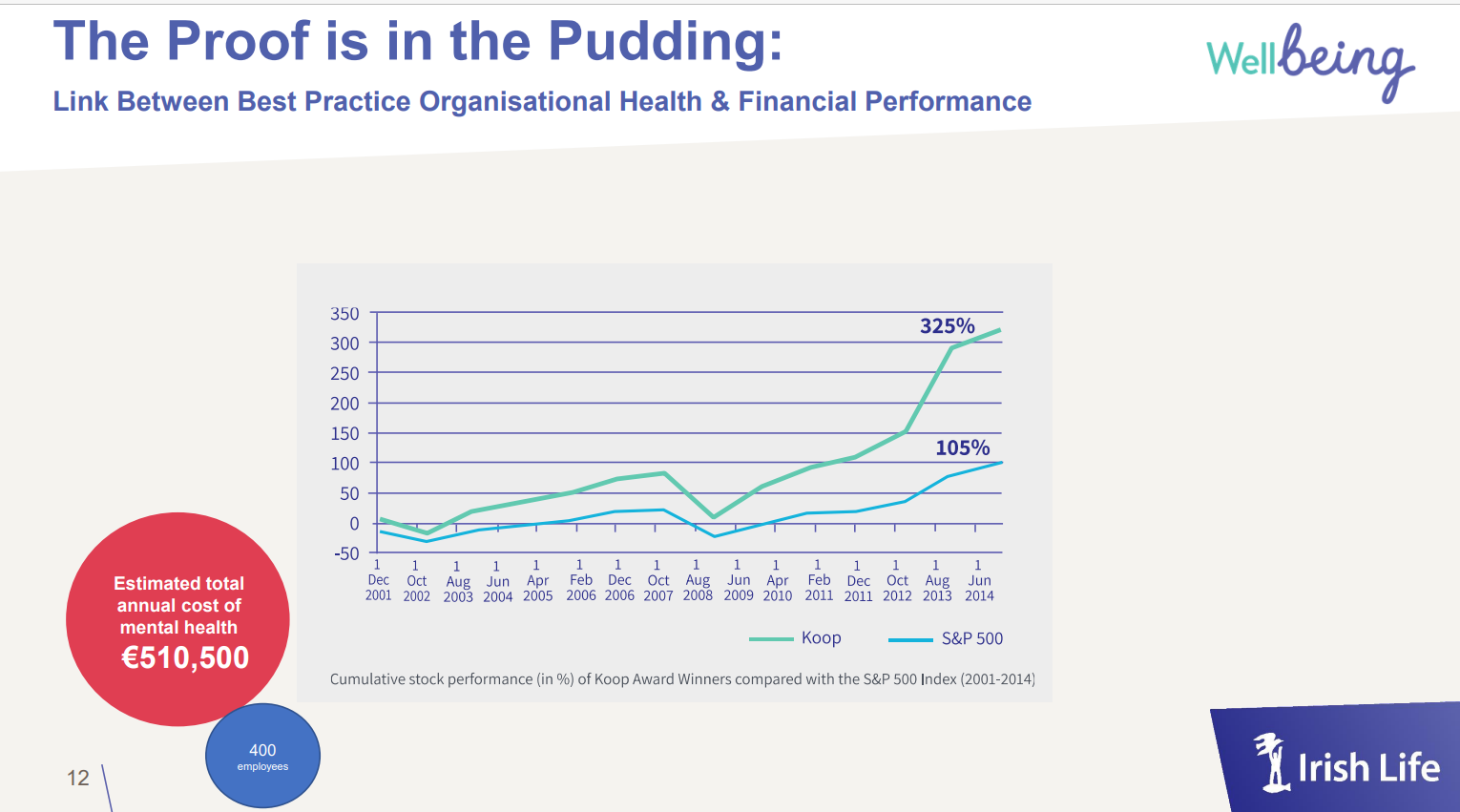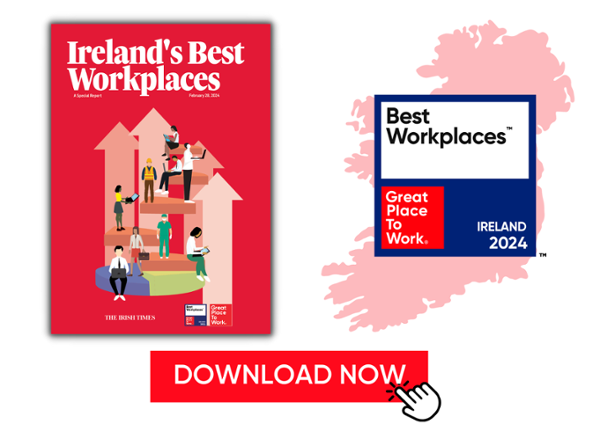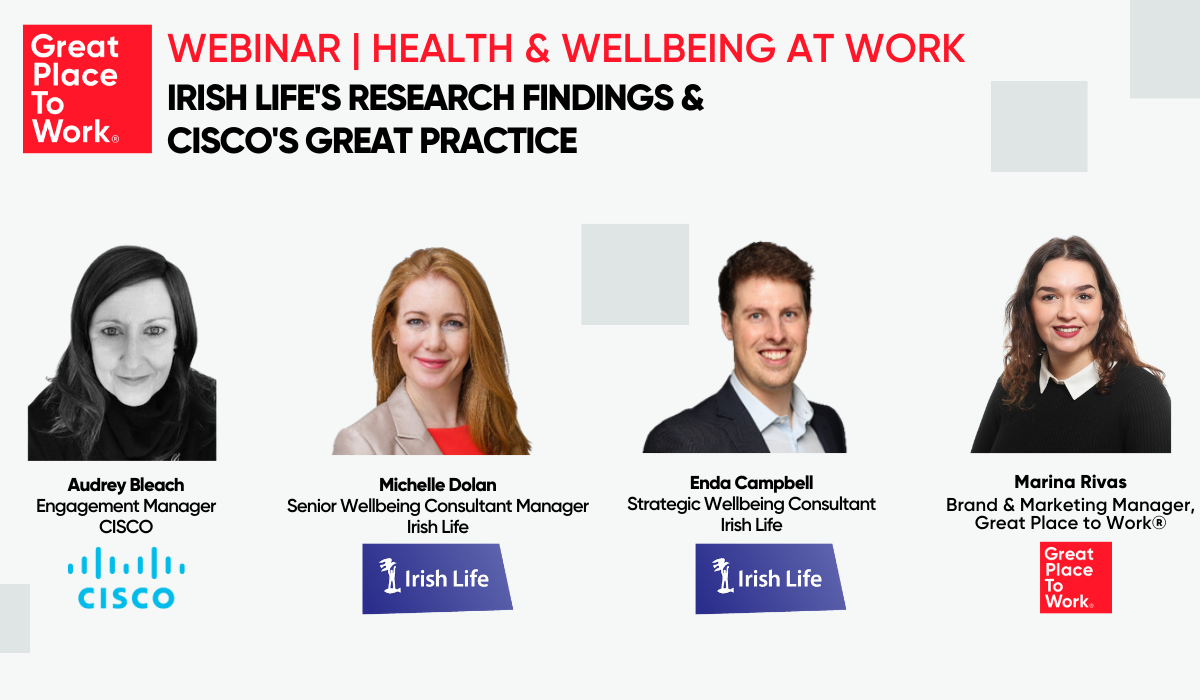
In today's fast-paced world, the significance of mental health and wellbeing support in the workplace cannot be overstated. As the boundaries between our personal and professional lives continue to blur, the need for a comprehensive approach to employee wellbeing has become increasingly evident. Recognising that a healthy mind is as crucial as a healthy body, organisations are awakening to the profound impact that mental health and wellbeing support can have on both their employees and their bottom line.
This is the topic of our Health & Wellbeing at Work webinar, where we cover important research on workplace health and wellbeing and the challenges organisations face when it comes to promoting this and implementing it companywide. In this webinar, we hear from Michelle Dolan and Enda Campbell from Irish Life, and Audrey Bleach from Cisco, about all the latest tips on how best to improve your workplace wellbeing culture, summarised below to refer back to when you need!
Data-driven programs
In starting up a wellbeing program, organisations should always aim to steer clear of "reactionary one-off programs", but instead look towards those that are data-driven. Collecting this data includes looking at EAP trends, internal data such as employee pulse surveys, absenteeism trends, attrition and retention, and working with stakeholders to understand the pain points they have across the business. Based on this data, these programs can be developed with these pain points at the forefront of the strategy.
This year, research collected by Irish Life helped bring focus to some worrying but key workplace trends:
-
Less than 35% of employees felt comfortable speaking to their manager about mental health
-
Just 30% of employees believed their managers had the skills and tools to support mental health needs at work
-
Where we know rates of addiction are on the increase, particularly in Ireland, only 29% felt comfortable speaking about addiction and workplace supports
-
And 32% of employees were fearful of negative repercussions if they were to open up and discuss their mental health needs
From this, it is clear to see that there is a perception out there among employees that managers are not skilled to be able to support them. Employees then aren’t comfortable speaking up, bringing with this a lack of psychological safety in the workplace. It's for this reason that it's important to ensure people leaders have the skills, the tools and also the confidence to be able to support these conversations and address and manage psychological safety. Ensuring people leaders have these skills is a key component to wellbeing in the workplace.
Coaching your people leaders
At Irish Life they have heavily invested in designing programs for people leaders, with the focus of education, skills training and culture. They aim to help managers understand things like what is workplace mental health and what the signs and symptoms of mental health issues are. If the signs can be identified early, the better equipped these leaders will be to actually do something about it.
"We want them to be able to communicate concerns in a tangible, factual way, staying away from diagnostic language. We don't expect our managers to be mental health experts or to fix problems. We focus on really clarifying and educating managers about their role and also the limitations to their role."
-Michelle Dolan, Senior Wellbeing Consultant Manager at Irish Life
For managers it's important to know that there's a duty of care to do something if they are concerned about their employees' mental health. Starting the conversation can often be the most difficult part for a manager and there can be a lot of apprehension about actually approaching the employee. By building up their skills in communication, listening, empathy and how to assess what the person needs, you can help equip your team to feel ready if the time comes for it to be necessary.
Culture of openness
Other research from Irish Life found that 40% of people agree that their colleagues are a source of support for them. From this, it's clear that making sure that the support is there across teams is of utmost importance, such as having mental wellbeing allies and supports. Being able to connect with their peers is vital for people leaders as it can be extremely daunting for somebody to be supporting other conversations without having those deeper groups to connect back in with.
What managers do or don't do has a real impact. A recent study found that managers can influence an employee's mental health up to 70% (1) - more than a doctor and more than a therapist. This is why it is so important to make sure that managers are equipped for success. But what does this look like in action?
At Irish Life they took over 200 of their managers through their coaching for managers program, coming from all different sectors. They identified their pain points, reviewed their mental health policy and were able to give recommendations and develop practice case scenarios. Michelle gave the example of hybrid working - what are the challenges faced by these managers around bringing people back into the office? Through this training program, Irish Life saw a:
-
45% improvement in these managers' ability to communicate their concerns to an employee that was struggling with a mental health issue
-
45% improvement in managers being able to deescalate a crisis when supporting employees
-
35% improvement in managers being able to recognise the signs of potential mental health issues
-
100% reported improved confidence and competency on the topic
It's clear that this type of training program is vital for an organisation's wellbeing supports, and also for making sure their people and people leaders feel fully equipped from the top down to deal with any issues that may arise.
Getting started
The most important thing to start with is data - and this can be as simple as pulling together what is already available to you. Looking into things like health insurance claims, absenteeism - why are people off sick? - employee surveys ... Can you take insight from these and get a feel of how your employees are feeling at work?
Making informed decisions is also key to this;
"A lot of people make the mistake of jumping straight in and seeing what is being done elsewhere and trying to fit that into their own organisation. And really, it's not always the case of just copying others - sometimes it works, but sometimes it doesn't"
-Enda Campbell, Strategic Wellbeing Consultant at Irish Life
Ensure you are asking the fundamental questions. Is your leadership bought in, have you done good planning, are you well organised, have you got funding? How well have you implemented the programs you have already done? Do you evaluate and review what you're doing as well? Asking these simple questions can be a great starting point for organisations to really see where they are in terms of producing a wellbeing program, and what more they can be doing.
Another fundamental aspect is making sure the structures for these programs are in place - for example setting up ambassadors and running trainings; at Irish Life they have a group of around 90 ambassadors in different parts of the business who themselves are taking ownership and planning the programs. These ambassadors are key in setting up a two-way communication method to get the information out there, but also getting the feedback to actually guide the programs. This further helps with sustainability - making sure that the responsibility isn't falling with one individual or group, but is truly embedded across the whole organisation.
Benefits for business
Data has shown that organisations who have well-rounded and meaningful programs tend to perform better than those who don't. As shown in the graph below, across a 14-year period, the top 500 companies in the world were measured against those with an Everett Koop award - companies who have extremely strong wellbeing programs in place. The findings found that these companies' financial performance strongly outperformed the top 500 companies in the world.
Irish Life looked into the cost of mental health in the areas of absenteeism, presenteeism - unproductive time at work - and turnover, and how this relates to mental health.
For a company of 400 employees, the cost of mental ill-health in these areas is €500,000 a year. From this it's clear that the cost of doing nothing in terms of wellbeing supports in a company of this size is quite significant. In trying to improve those areas, straight away this is a cost that's going out of the business.

An organisation who has implemented these great practices from the top down is Cisco. Cisco's overall purpose is to power an inclusive culture for all. They have 83,000 employees globally and around 360 offices. In an organisation this large, great practices on these topics are vital for widespread organisational success.
Cisco's holistic approach to wellbeing
Cisco aim to put their people at the centre of everything they do - as Audrey Bleach, Engagement Manager at Cisco emphasised, "it's about having the basics, and from there seeing what you can keep adding each year and working through those".
The 4 pillars in their wellbeing strategy and some examples of this are:
- Physical: investing with Irish Life on a health and benefits package, onsite gym, online facilities for employees to participate in such as yoga
- Emotional: EAP through Irish Life, raising awareness through Global Health & Wellness Week, implementing this throughout the year
- Social: making the effort to connect people
- Financial: partnering with a financial advice company to give extra support for employees
The effect leaders have on these pillars shouldn't be understated. At Cisco they have quarterly training programs for leaders to discuss all top of mind subjects, and really delve into how they can best support leaders' needs so they can live Cisco's principles and values.
Check out who made Ireland's Best Workplaces in our exclusive report below 👇
Conscious culture
Cisco refer to their culture as a "conscious culture" - in basic terms, they want to make it an inclusive and positive environment for everybody across the company - for employees, but also customers as well.
Authentic leadership: Every six weeks there is a global all-hands for executive leadership where business strategy is discussed but also always an element of wellbeing and how they are doing as teams. This is also done on a local level, to keep up regular open communication so that all employees can feed into this.
Benefits and support: For Cisco this involves things like great healthcare for employees, pension, etc., but one particular benefit is (paid) critical time off. They recognise that employees are at different stages of their lives and all going to go through an emergency at some stage. These are particularly key times to support your employees' wellbeing. For example for a bereavement, there is no specific timeframe of days allowed to be taken off - this critical time off policy is about taking enough time for you to grieve.
Support days: In the last number of years, Cisco have implemented "Days For Me", where the whole company shuts down, everyone has the day off, and everyone has the freedom to do something that they enjoy. In 2023 employees got four extra "Days For Me", fully paid for by the company. When first introduced, these days were spontaneous, but on hearing feedback from employees on how they'd like notice so they could plan the days better, the days are told at the start of the year and tagged onto a weekend so they can be fully enjoyed by all and given that extra break. 10 paid volunteer days per year are also given to Cisco employees, to volunteer for charities and things they are passionate about, as well as birthdays being given off.
#SafeToTalk: This is a peer-to-peer space where people can talk openly about how they're feeling. It is monitored by their ER team in case there's anything that needs extra support, and resources are provided in their SharePoint group on where to go, with different webinars and seminars on throughout the year.
Managers role modeling: From a local perspective, a leader at Cisco spoke openly at an all-hands meeting about burnout, where he was open and honest about his experience. This in turn led to a lot of authentic conversation around burnout across the business, with people learning to recognise the signs. From this then, as a local site they were able to work with Irish Life to put in place some extra talks. This was all down to a manager acting as a role model and not being afraid to be vulnerable and open to everyone.
Holistic wellbeing: Cisco partner with external company Pavelka to focus on connecting their people through wellbeing. Focusing on things like healthy eating habits and hosting different work challenges, these are extra resources for employees to know how best to deal with wellbeing, not strictly confined to a work setting.
Similar to employee resource groups, Cisco have "inclusive communities", which help build that sense of community companywide. Each of these have buy-in from an executive leader as well as an ally. An example of this is their "Emerging Talent" community, which arose after they felt new hires should have a way to meet peers and get connected after being onboarded. Their main aim is to connect, educate and give back, focusing on personal and professional wellbeing.
At Cisco they break wellbeing into two areas: personal well-being - "how am I doing as a person?", and social well-being - "how are we doing as a company?" This helps them assess what they need to focus on next. They acknowledge that everyone is at different stages in their journey, whether personal or professional, and how important it is to keep reviewing this. They have found through surveying their employees, those who rate highest in feeling positive about their wellbeing have demonstrated that they are more engaged and feel positive about their experience at Cisco.
As demonstrated by our webinar guests' great insights, it is clear to see that by investing in the emotional and psychological welfare of employees, organisations can create a culture of empathy, resilience, and high performance. As we move forward through everchanging work cultures in the coming years, it is our collective responsibility to champion these initiatives and ensure that every workplace can foster a culture for both professional growth and personal wellbeing. Through proactive measures and open conversation, we can pave the way for a brighter, more inclusive future for employees and businesses alike.
Check out the full webinar below! 👇
Sources
(1) https://www.ukg.com/resources/article/mental-health-work-managers-and-money
About Great Place to Work®
Great Place to Work® is the global authority on workplace culture. We help organisations quantify their culture and produce better business results by creating a high-trust work experience for all employees. We recognise Great Place to Work-Certified™ companies and the Best Workplaces™ in more than 60 countries. To join the thousands of companies that have committed to building high-trust company cultures that help them attract, retain and take care of their people, contact us about getting Certified today.
 Argentina |
Argentina |  Australia |
Australia |  Austria |
Austria |  Belgium |
Belgium |  Bolivia |
Bolivia |  Brazil |
Brazil |  Canada |
Canada |  Central America & Caribbean |
Central America & Caribbean |  Chile |
Chile |  Colombia |
Colombia |  Denmark |
Denmark |  Ecuador |
Ecuador |  Finland |
Finland |  France |
France |  Germany |
Germany |  Global |
Global |  Greater China |
Greater China |  Greece |
Greece |  Hong Kong SAR |
Hong Kong SAR |  India |
India |  Ireland |
Ireland |  Italy |
Italy |  Korea |
Korea |  Luxembourg |
Luxembourg |  Mexico |
Mexico |  Nigeria |
Nigeria |  Norway |
Norway |  Paraguay |
Paraguay |  Peru |
Peru |  Poland |
Poland |  Portugal |
Portugal |  Qatar |
Qatar |  Saudi Arabia |
Saudi Arabia |  Singapore |
Singapore |  Sri Lanka |
Sri Lanka |  Sweden |
Sweden |  Switzerland |
Switzerland |  The Netherlands |
The Netherlands |  Turkey |
Turkey |  United Arab Emirates |
United Arab Emirates |  United Kingdom |
United Kingdom |  United States |
United States |  Uruguay |
Uruguay |  Venezuela |
Venezuela | %20}})
-4.png?width=2160&height=2160&name=2021_gptw_logo_primary_red%20(1)-4.png)


.jpg?width=945&height=236&name=YuMuuv%20Banner%20(1).jpg)







